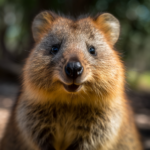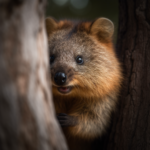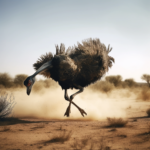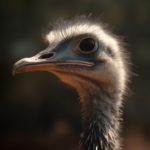Quokkas, also known as the happiest animals on Earth, have gained popularity in recent years due to their adorable appearance and friendly demeanor. These small marsupials, native to Western Australia, have captured the hearts of many with their seemingly constant smile. As a result, some people may wonder if quokkas make good pets. While they may seem like the perfect companion, it’s important to consider various factors before deciding to keep a quokka as a pet. In this article, we will explore the characteristics of quokkas, their natural habitat, and the challenges associated with keeping them as pets. By the end, you’ll have a better understanding of whether a quokka is the right pet for you.
Key Takeaways
- Quokkas are not suitable as pets due to their specific habitat requirements and specialized diet.
- Quokkas are wild animals that should be left undisturbed in their natural environment.
- Interacting with quokkas in the wild should be done responsibly and without causing harm to the animals or their habitat.
Understanding Quokkas: The Happiest Animals on Earth
A. Why are Quokkas So Happy?
Quokkas, often referred to as the “happiest animals on Earth,” have gained worldwide attention for their adorable smiles and friendly demeanor. But what exactly makes these small marsupials so joyous? Let’s delve into the reasons behind their perpetual happiness.
-
Natural disposition: Quokkas are naturally friendly and sociable creatures. They have a gentle temperament and are known to be curious and inquisitive. This inherent friendliness contributes to their overall happiness and makes them a delight to be around.
-
Lack of predators: One of the primary reasons quokkas are so happy is their lack of natural predators on Rottnest Island, their native habitat. With no significant threats to their safety, quokkas can roam freely without constant fear, allowing them to live a stress-free life.
-
Abundance of food: Quokkas have a varied diet consisting of grasses, leaves, and even small insects. Their habitat provides an abundance of food sources, ensuring they never go hungry. This constant availability of nourishment contributes to their overall well-being and contentment.
-
Minimal human interference: Quokkas have had limited interaction with humans, which has allowed them to maintain their natural behaviors and instincts. This lack of interference has preserved their happiness and prevented them from becoming overly dependent on human interaction.
B. The Friendly Nature of Quokkas
Quokkas are renowned for their friendly nature, and this characteristic has endeared them to people around the world. Here are some key aspects of their friendliness:
-
Approachable and curious: Quokkas are known to approach humans without fear or aggression. They are naturally curious creatures and often display a sense of playfulness when interacting with people. This friendly behavior has made them popular among tourists and locals alike.
-
Photogenic and smiley: Quokkas have a unique facial structure that gives them a perpetually smiling expression. This adorable feature has made them famous on social media, with countless selfies featuring these happy marsupials. Their photogenic nature adds to their appeal as friendly and approachable animals.
-
Non-threatening demeanor: Quokkas have a non-threatening demeanor, which makes them suitable for close interaction. They rarely display aggressive behavior, even when approached by humans. This gentle nature makes them safe to be around, further enhancing their reputation as friendly animals.
-
Positive impact on mental health: Interacting with quokkas has been shown to have a positive impact on human mental health. Their friendly and happy demeanor can uplift spirits and bring joy to those who encounter them. This has led to an increase in ecotourism and wildlife conservation efforts in quokka habitats.
In conclusion, quokkas’ happiness can be attributed to their natural disposition, lack of predators, abundant food sources, and minimal human interference. Their friendly nature, approachability, and photogenic smiles have made them beloved creatures, capturing the hearts of people worldwide. While quokkas may not be suitable as pets due to their protected status and specific habitat requirements, their presence in the wild brings joy and serves as a reminder of the beauty of nature.
The Life of a Quokka

A. How Long Do Quokkas Live?
Quokkas, known for their adorable smiles and friendly demeanor, have a relatively long lifespan compared to other small marsupials. On average, these charming creatures live for about 10 years in the wild. However, in captivity, where they receive proper care and nutrition, quokkas can live up to 15 years or even longer.
The longevity of quokkas can be attributed to their unique adaptations and habitat. These small marsupials are native to Western Australia, specifically found on Rottnest Island and a few other nearby locations. The absence of natural predators on Rottnest Island allows quokkas to thrive and live longer lives.
B. Are Quokkas Fast?
While quokkas may not be the fastest animals in the animal kingdom, they are surprisingly agile and can move swiftly when needed. Quokkas have strong hind legs, which enable them to hop and jump with ease. This hopping ability allows them to cover short distances quickly and escape from potential threats.
However, it’s important to note that quokkas are not built for sustained speed. Their primary mode of transportation is hopping, which is more energy-efficient for their small bodies. So, while they may not win any races, their agility and quick movements make them well-suited to their natural environment.
C. How Much Do Quokkas Eat a Day?
Quokkas are herbivores, meaning their diet consists mainly of plants and vegetation. They have a unique ability to survive on a variety of food sources, including leaves, grasses, bark, and even small shrubs. Despite their small size, quokkas have a relatively high metabolic rate, which requires them to consume a significant amount of food each day.
On average, quokkas consume about 200 grams of food per day, which is roughly equivalent to 25% of their body weight. They have a specialized digestive system that allows them to efficiently extract nutrients from their plant-based diet. Quokkas also have the ability to store fat in their tails, which acts as a reserve during times of food scarcity.
It’s important to note that quokkas have specific dietary requirements, and their nutritional needs must be met to ensure their overall health and well-being. In captivity, it is crucial to provide them with a balanced diet that mimics their natural food sources to promote their longevity and overall vitality.
In conclusion, quokkas have a relatively long lifespan, are agile in their movements, and have specific dietary needs. Understanding these aspects of their life can help us appreciate these unique creatures and ensure their well-being, whether in the wild or in captivity.
The Importance of Quokkas in the Ecosystem

A. Why are Quokkas Important?
Quokkas, native to Western Australia, play a vital role in the ecosystem. Despite their adorable appearance and friendly demeanor, these small marsupials have a significant impact on their environment. Let’s explore why quokkas are important and how they contribute to the delicate balance of biodiversity.
-
Seed Dispersal: Quokkas are excellent seed dispersers. As they move around their habitat, they consume a variety of plant material, including fruits, leaves, and seeds. These seeds then pass through their digestive system and are deposited in different locations through their droppings. This process helps in the dispersal of seeds, allowing plants to colonize new areas and maintain genetic diversity.
-
Pollination: Quokkas also play a role in pollination. While foraging for nectar, they inadvertently transfer pollen from one flower to another, aiding in the reproduction of various plant species. This interaction between quokkas and plants is crucial for the survival and propagation of many flowering plants in their habitat.
-
Habitat Modification: Quokkas are known to modify their habitat through their feeding and movement patterns. By selectively grazing on certain plant species, they can influence the composition and structure of vegetation. This, in turn, affects the availability of resources for other animals, such as insects and birds, creating a ripple effect throughout the ecosystem.
B. The Role of Quokkas in Biodiversity
Quokkas are considered a keystone species, meaning they have a disproportionately large impact on their ecosystem relative to their abundance. Their presence or absence can significantly affect the overall biodiversity of an area. Here’s how quokkas contribute to biodiversity:
-
Predator-Prey Dynamics: Quokkas serve as prey for a variety of predators, including snakes, birds of prey, and feral cats. Their population dynamics influence the abundance and distribution of these predators, which, in turn, affects the populations of other species lower down the food chain. By maintaining a healthy quokka population, we indirectly support the survival of their predators and the balance of the entire ecosystem.
-
Species Interactions: Quokkas engage in complex interactions with other species in their habitat. For example, they have a mutualistic relationship with certain bird species, such as the black-winged stilt, where the birds benefit from the quokkas’ foraging activities by capturing insects stirred up by their movement. These interactions contribute to the intricate web of relationships that sustain biodiversity.
-
Indicator Species: Quokkas can act as indicators of ecosystem health. Their sensitivity to changes in their environment, such as habitat loss or degradation, makes them valuable indicators of the overall well-being of the ecosystem. Monitoring quokka populations and their behavior can provide valuable insights into the impacts of human activities on the natural environment.
In conclusion, quokkas are not just adorable creatures; they play a crucial role in the ecosystem. From seed dispersal to pollination and habitat modification, their actions have far-reaching effects on the biodiversity of their habitat. Recognizing the importance of quokkas in the ecosystem is essential for their conservation and the preservation of the delicate balance of nature.
The Feasibility of Quokkas as Pets

A. Can Quokkas Be Kept as Pets?
Quokkas, with their adorable smiles and friendly demeanor, have captured the hearts of many people around the world. As a result, some individuals may wonder if it is possible to keep these charismatic creatures as pets. However, it is important to understand the practicality and responsibility that comes with owning a quokka.
Quokkas are native to Western Australia and are considered a protected species. This means that they are not readily available for private ownership, and it is illegal to keep them as pets without the necessary permits and licenses. The Australian government has strict regulations in place to protect the welfare of these animals and ensure their conservation in the wild.
Moreover, quokkas have specific care requirements that can be challenging to meet in a domestic setting. These small marsupials have evolved to thrive in their natural habitat, which consists of dense forests and shrublands. Recreating such an environment in a home would be extremely difficult and may not provide the necessary space and resources for a quokka to live a healthy and fulfilling life.
B. The Legal and Ethical Implications of Keeping Quokkas as Pets
The legal and ethical implications of keeping quokkas as pets are significant. As mentioned earlier, it is illegal to own a quokka without the appropriate permits and licenses. This is because quokkas are protected under Australian law, and their conservation status is of utmost importance.
Quokkas are a part of Australia’s unique wildlife, and their presence in the wild contributes to the overall biodiversity of the region. By keeping them as pets, there is a risk of disrupting their natural habitat and potentially contributing to their decline in the wild. It is crucial to respect and protect these animals by allowing them to live freely in their natural environment.
Furthermore, quokkas have specific social and behavioral needs that may not be met in a domestic setting. They are highly social animals and thrive in large groups. In captivity, they may experience loneliness and stress due to the lack of social interaction and the inability to engage in natural behaviors.
In conclusion, while quokkas may seem like adorable and appealing pets, it is important to consider the legal and ethical implications of keeping them in captivity. The best way to appreciate and admire these unique creatures is by observing them in their natural habitat or supporting conservation efforts that aim to protect their welfare and preserve their population for future generations to enjoy.
The Reality of Quokkas as Pets
A. Do Quokkas Make Good Pets?
Quokkas, with their adorable smiles and friendly demeanor, have gained significant popularity in recent years. These small marsupials, native to Western Australia, have become somewhat of an internet sensation due to their photogenic nature and seemingly approachable behavior. However, before considering a quokka as a pet, it’s important to understand the reality of their suitability as domestic companions.
While quokkas may appear cute and cuddly, it’s crucial to remember that they are wild animals and have specific needs that may not align with the expectations of a typical pet owner. Here are some key factors to consider when evaluating whether quokkas make good pets:
-
Legal Considerations: Before even contemplating the idea of keeping a quokka as a pet, it’s essential to research the legalities surrounding their ownership. In many jurisdictions, including Australia, quokkas are protected wildlife, and it is illegal to keep them as pets without the necessary permits or licenses. It is crucial to respect and abide by these regulations to ensure the well-being and conservation of these unique creatures.
-
Specialized Care Requirements: Quokkas have specific care needs that may be challenging for the average pet owner to meet. These animals require a habitat that closely resembles their natural environment, including access to vegetation, water, and appropriate shelter. Creating and maintaining such an environment can be complex and costly, requiring extensive knowledge and resources.
-
Dietary Considerations: Quokkas have a unique diet consisting mainly of vegetation, including leaves, grasses, and bark. Providing a nutritionally balanced diet that mimics their natural food sources can be challenging and may require expert guidance. It’s crucial to ensure that their dietary needs are met to maintain their overall health and well-being.
-
Temperament and Socialization: While quokkas may appear friendly and approachable in their natural habitat, it’s important to remember that they are still wild animals. Their behavior can be unpredictable, and they may not adapt well to domestication. Quokkas are naturally social animals and thrive in large groups. Isolating them from their natural social structures can lead to stress and behavioral issues.
-
Health Considerations: Quokkas, like any living creature, are susceptible to various health issues. They may carry diseases or parasites that can be transmitted to humans or other pets. Additionally, finding veterinary care experienced in treating quokkas may be challenging, as they are not commonly kept as pets.
B. The Challenges and Responsibilities of Keeping Quokkas as Pets
Keeping quokkas as pets comes with significant challenges and responsibilities that should not be taken lightly. Here are some additional factors to consider:
-
Time Commitment: Quokkas require a considerable amount of time and attention. They need daily care, including feeding, cleaning, and monitoring their overall well-being. Additionally, providing mental and physical stimulation is crucial to prevent boredom and ensure their overall happiness.
-
Financial Considerations: Owning a quokka can be financially demanding. The initial cost of acquiring a legal permit or license, as well as setting up an appropriate habitat, can be substantial. Ongoing expenses such as food, veterinary care, and maintenance can also add up over time.
-
Ethical Concerns: Keeping wild animals as pets raises ethical questions. Quokkas are native to Western Australia and play an essential role in the ecosystem. Removing them from their natural habitat for personal enjoyment can disrupt the delicate balance of the environment and contribute to the decline of their population.
-
Alternative Ways to Interact: Instead of trying to keep a quokka as a pet, there are alternative ways to interact with these fascinating creatures. Many wildlife parks and sanctuaries in Western Australia offer opportunities for visitors to observe and interact with quokkas in a controlled and responsible manner. These experiences allow for a deeper understanding and appreciation of their natural behavior while supporting conservation efforts.
In conclusion, while quokkas may appear to be adorable and friendly, they are not suitable pets for the average person. Their specialized care requirements, legal considerations, and ethical concerns make it challenging and often inappropriate to keep them as domestic companions. It is crucial to respect and appreciate these unique creatures in their natural habitat and support conservation efforts to ensure their long-term survival. Conclusion
In conclusion, while quokkas may seem adorable and friendly, they are not suitable as pets. These small marsupials have specific needs and requirements that are difficult to meet in a domestic setting. Quokkas are wild animals that thrive in their natural habitat, and attempting to keep them as pets can lead to stress, health issues, and a compromised quality of life. It is important to respect and protect these unique creatures by appreciating them from a distance and supporting conservation efforts. Instead of trying to make quokkas into pets, we can admire their cuteness through photographs and visit them in their natural habitat on Rottnest Island, where they can live freely and happily.
Frequently Asked Questions
Do quokkas make good pets?
No, quokkas do not make good pets. They are wild animals native to Australia and have specific needs that are difficult to meet in a domestic environment. Moreover, it’s illegal to keep them as pets in their native Australia.
Why are quokkas so happy?
Quokkas are often perceived as being happy because of their facial structure. Their mouth is shaped in such a way that it appears as though they are smiling. However, this is just a physical characteristic and not an indicator of their emotional state.
Are quokkas fast?
Quokkas are not particularly fast animals. They are more adapted to a life of climbing trees and hopping around in the underbrush of their native Australian habitats.
Can quokkas be pets?
It is illegal to keep quokkas as pets. They are a protected species in Australia and their care and handling are regulated by strict laws and regulations.
Why are quokkas important?
Quokkas are important because they play a crucial role in their ecosystem. They help in the dispersal of seeds, contributing to the biodiversity of their habitat. They are also an important part of the food chain.
Why are quokkas so friendly?
Quokkas are perceived as friendly because they are not typically afraid of humans. This is likely due to a lack of natural predators on the islands where they live. However, they are wild animals and should not be treated as pets.
How much do quokkas eat a day?
Quokkas typically eat a diet of leaves, grasses, and bark. The exact amount they eat can vary, but it’s estimated that they consume about a pound of vegetation a day.
Can quokkas be kept as pets?
As mentioned earlier, it is illegal to keep quokkas as pets. They are a protected species and their care requires specific knowledge and resources.
Why are quokkas the happiest animals?
Quokkas are often referred to as the “happiest animals” due to their seemingly constant smile. However, this is just a characteristic of their facial structure and not a reflection of their emotional state.
How long do quokkas live?
Quokkas have a lifespan of about 10 years in the wild. In captivity, they can live a bit longer with proper care, reaching up to 15 years. However, they are not meant to be kept as pets.




